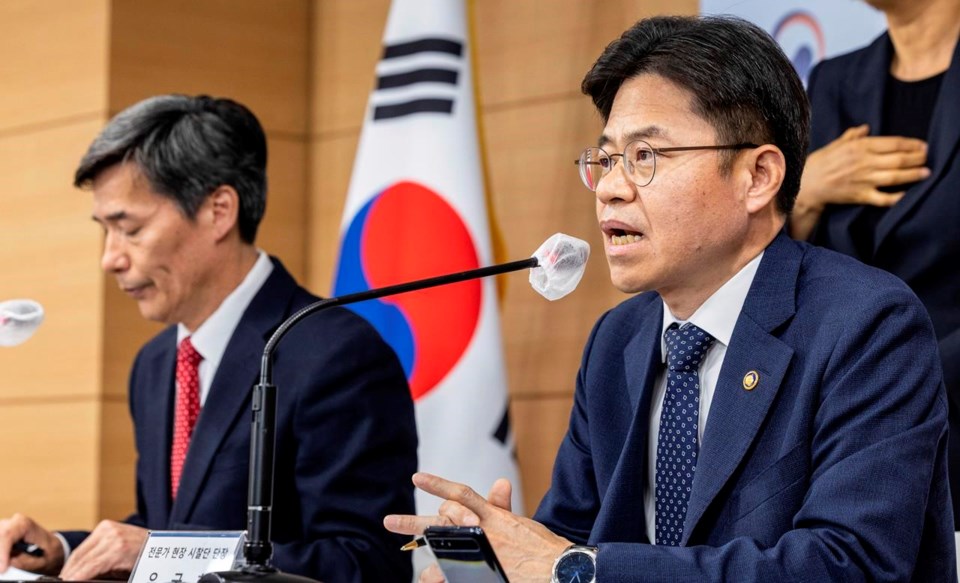SEOUL, South Korea (AP) — South Korea will send a 21-member team of government experts to Japan next week to visit the Fukushima nuclear power plant where they will review contentious Japanese plans to release treated but slightly radioactive water into the sea.
The six-day visit starting Sunday will focus on examining the plant’s processing system, which reduces radioactive materials from contaminated water, and whether the treated water would be safe enough to be diluted and discharged into the ocean, officials said Friday.
The safety of the water for years has been a sensitive issue between the U.S. allies, who are now working to repair long-strained ties to address joint challenges like the North Korean nuclear threat and China’s assertive foreign policy.
After a summit with South Korean President Yoon Suk Yeol this month, Japanese Prime Minister Fumio Kishida announced that his government had agreed to host a team of South Korean experts at Fukushima to calm South Korean concerns about food safety, in a show of his desire for improved ties.
Japanese officials say the South Korean visit to the plant will not amount to a genuine inspection, as the safety of the water discharge plan is already under review by the International Atomic Energy Agency, which may publicize the results next month.
The South Korean experts will be briefed by Japanese officials over water treatment details and discharge plans on Monday before visiting some facilities at the Fukushima plant on Tuesday and Wednesday. The South Koreans will then have “in-depth technical discussions” with related Japanese authorities based on their observations on Thursday before returning home, Park Ku-yeon, first vice minister of South Korea’s Office for Government Policy Coordination, said during a briefing.
The South Korean team will be led by Yoo Guk-hee, chairperson of the Nuclear Safety and Security Commission, who said his focus will be on the plant’s advanced liquid processing system, or ALPS, which is designed to reduce dozens of types of radioactive isotopes in the contaminated water to safe levels.
“(Japan) has accepted almost all of our requests on the facilities we had hoped to see, except for those that had higher concerns for radioactive contamination or other safety issues,” Park said.
South Korean officials say Japan has refused to receive South Korean private experts to the site, describing the visit as a government-to-government matter. Park said private experts may participate in an advisory group South Korea plans to form later to cross-examine the information gained from the visit.
Japan’s Foreign Ministry also confirmed the South Korean delegation’s visit to the Fukushima plant in a statement that also endorsed the effectiveness of the ALPS system, saying it ensures that all radioactive materials other than tritium are reduced to safe levels.
“It is planned that ALPS-treated water will then be sufficiently diluted before the discharges so that the concentrations of the radioactive materials including tritium will be far below the regulatory standards for safety,” the ministry said.
A massive earthquake and tsunami in 2011 destroyed the Fukushima plant’s cooling systems, causing three reactors to melt and release large amounts of radiation.
Tokyo Electric Power Company Holding, which operates the facility, has been storing the ALPS-treated water in hundreds of tanks that now cover most of the plant and are nearly full. Japanese officials say the tanks must be removed to make room to build facilities for the plant’s decommissioning and to minimize the risk of leaks in case of another major disaster. The tanks are expected to reach their capacity of 1.37 million tons in early 2024.
Japan first announced plans to discharge the treated water into the sea in 2018, saying that the treated water will be further diluted by seawater before being released in a carefully controlled process that will take decades to complete.
“We will focus on the ALPS facility and the status of the ocean discharge facility and will also review analyses of the contamination levels in ALPS-treated water, which will take place in the building’s chemical analysis building,” Yoo said about the South Korean visit.
“We also plan to have in-depth discussions and question-and-answer sessions with Japanese officials about assessments on the radiation’s environmental impact, including possible accumulation in eco systems,” he said.
South Korea’s government has not provided a specific time for when it would release the results of its findings in Fukushima. South Korean officials say Seoul will not consider lifting its import ban on seafood from Fukushima even if it determines Japan’s water release plan is safe, citing South Korean public concerns and a need for deeper investigations into the environmental impact of the 2011 disaster.
—
AP writer Mari Yamaguchi contributed from Hiroshima, Japan.
Kim Tong-hyung, The Associated Press



